Ember Travel Diaries: ACUFA, Argentina
Jul 26, 2022
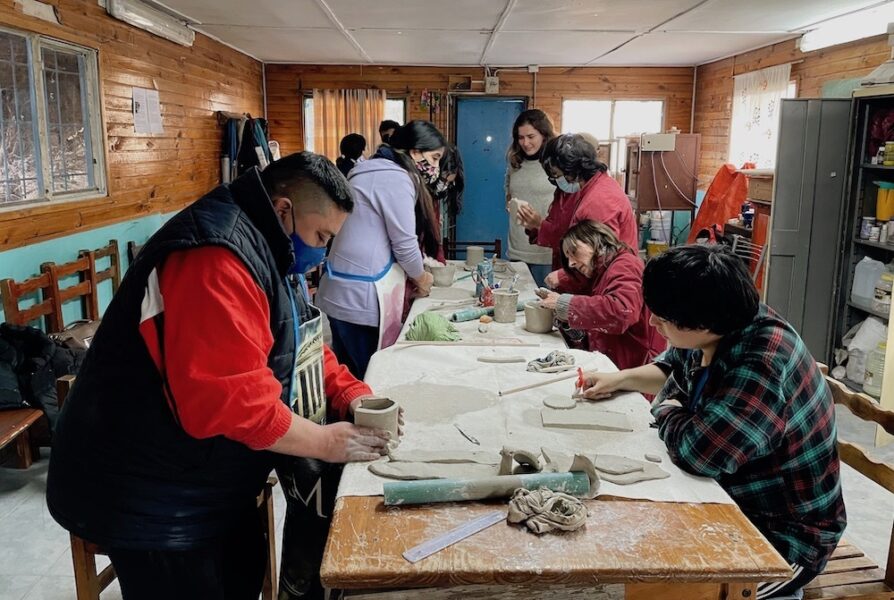
Combining a cultural centre, textile social enterprise, peer support and hospital care, ACUFA is a truly innovative and integrated model of mental health support. Our team member June shares her experiences of a recent visit to the ACUFA team in Argentina. Desplácese hacia abajo para leer este blog en español.
Landing in Bariloche, a city in the province of Río Negro in the breath-taking Argentinian Patagonia, I was greeted by Mirta Elvira, founder of ACUFA (Asociación Civil de Usuarios, Familiares y Amigos de la Salud Mental; in English, Civil Association of Mental Health Users, Family Members and Friends). After months of working together over Zoom, meeting in person felt like reuniting with an old friend. Throughout the following days, I had the privilege of witnessing first-hand the invaluable work of the organization – a support network with a mission to ensure that people with lived experience and their family members can readily access care and information in the community and can fully engage with dignified opportunities for personal development through employment and creative activities.
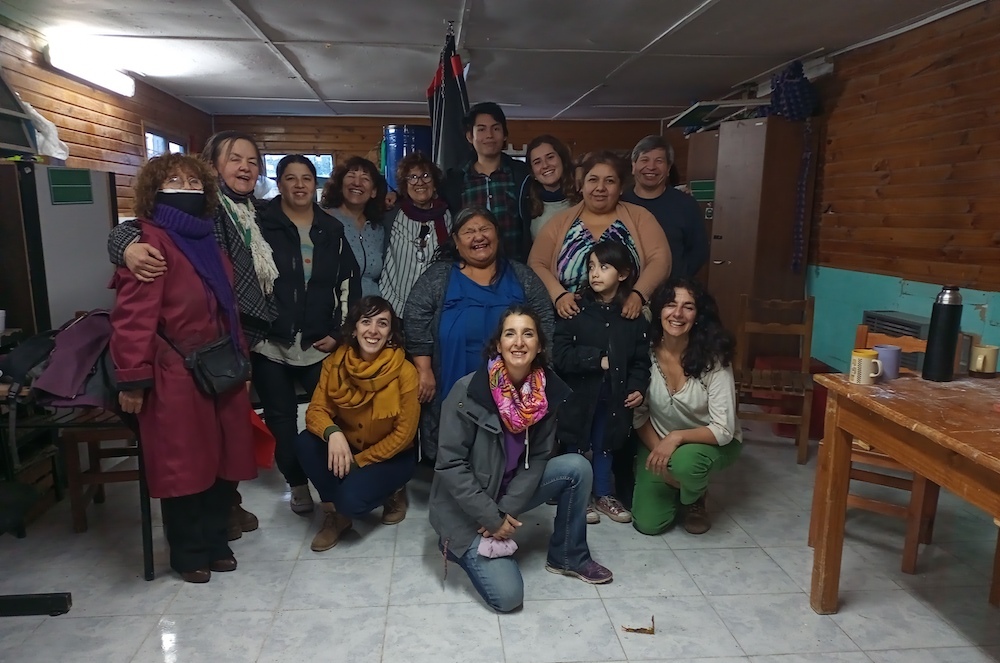
The province of Rio Negro, where ACUFA is located, was a pioneer worldwide in establishing a mental health law that prioritises the deinstitutionalisation of mental health care. In other words, this law promoted the transition from a mental health system in which people were confined to treatment within the psychiatric hospital, to one where care is provided within a general hospital and by a network of community-based services (including intermediate care services, halfway homes, cultural centres, and social enterprises). This comprehensive support system coordinates to help individuals transition back into the community and fully participate in society.
However, since the law was made effective in 1991, not enough public policies have followed through to facilitate its implementation, due to the lack of an appropriate budget, amongst other things. Therefore, ACUFA's work stands out as one of the only successful and long-standing examples of community-based mental health care in the region.
Right at the shore of Lake Nahuel Huapi, lies Camino Abierto, the cultural center that ACUFA is linked to and hosted within. Welcomed by its colourful, hand-painted walls and by everyone drinking Argentinian mate in the kitchen, I could immediately feel the essence of its name, which means ‘open path’ in English.
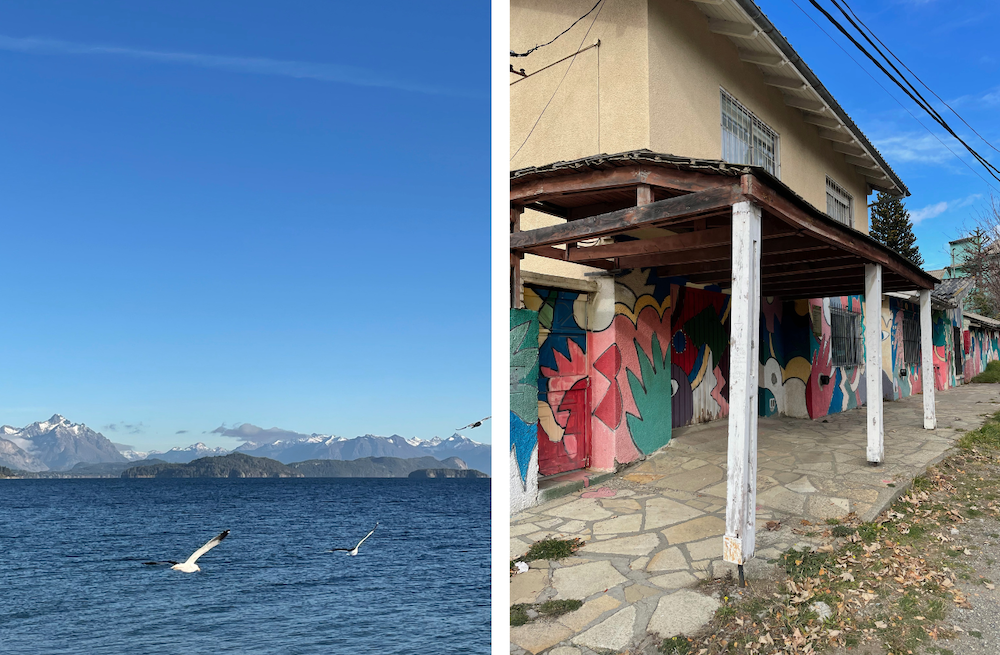
Camino Abierto is open Monday to Friday for anyone in the community that wants to spend the day there, participate in artistic activities – ranging from dance, to pottery, to cooking classes – or receive therapeutic support. The center is run in coordination with the local hospital, so a diversity of mental health workers are available to provide psychological and psychiatric support as necessary. Rosa, for example, reads her poetry every Wednesday on Camino Abierto’s radio, called Radio La Mariposa: “It makes me feel that I am alive, that someone is listening to me,” she shares with me.
The idea is that any individual – with or without a mental health diagnosis – is welcome at Camino Abierto, and can learn new skills, hang out with friends, or even run a workshop if there is a particular interest they want to share with others. Camino Abierto offers anyone a space to belong. Alfonso, who is part of the ACUFA team and runs addiction prevention workshops at Camino Abierto spoke to me about the importance of spaces like this in the community:
“I learned from being in Camino Abierto that this is what community mental health is all about, that the 'cure' lies in inclusion [and] greater participation in the social space".
During one of the pottery workshops, I began speaking to Feli, an artist and mother of two who has now become a regular at Camino Abierto. She tells me how she has been working for two years now at Maquinando, the textile social enterprise that is also part of ACUFA. Being able to have a job is central to her wellbeing: "It gives me a lot of comfort as a woman, as a mother, and [allows me] to recover a bit of integrity around something that is disregarded, which is the difficulty of finding a job when you are going through very hard times. And here I had that possibility".
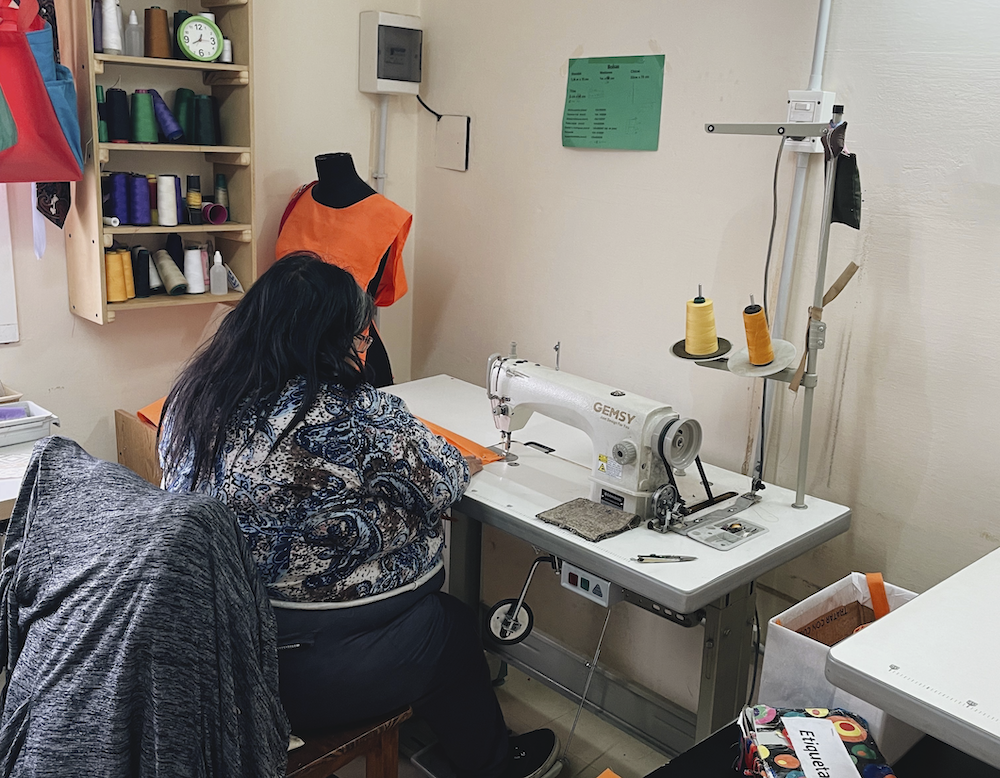
When I got a chance to see the Maquinando team in action, they were working hard on finishing an order from the local shop for bags for their customers. The team is currently at capacity with the high number of orders they receive from local businesses and the hospital (for which they make some of the uniforms), but as they acquire more resources, they hope to grow. I asked Feli where she’d like to see Maquinando in the near future: “slowly, [I’d like us] to keep growing as entrepreneurs. I think that would be good, that our little company would keep developing. I find that comforting, it incentivizes us.”
Even outside of the physical space, ACUFA’s core team works around the clock to raise awareness and provide support to the community. If not attending a webinar or liaising with local institutions, their phones are constantly buzzing with requests for support from family members about difficult experiences of care. This is one area of work that the team hopes to formalize in the future: set-up a physical support hub for family members, where people can access drop-in for support, attend psychoeducation workshops or receive home visits.
However, despite the demand from the community and the ambition to grow, the lack of funding opportunities both locally and internationally, means that expanding their work is currently very challenging. The ACUFA team works voluntarily, juggling the organization’s operation with other jobs and responsibilities. Ember is currently supporting the team to develop a communications strategy and consolidate an operational model that will support the organization’s fundraising efforts. We hope the Ember partnership can support ACUFA in its crucial work, setting an example for a model of community-based mental health care.
Mate in hand, Alfonso tells me: "it shows you that there is another way of understanding mental health, that there is another way of understanding people".
Thank you to the ACUFA team for welcoming me so kindly in Bariloche!
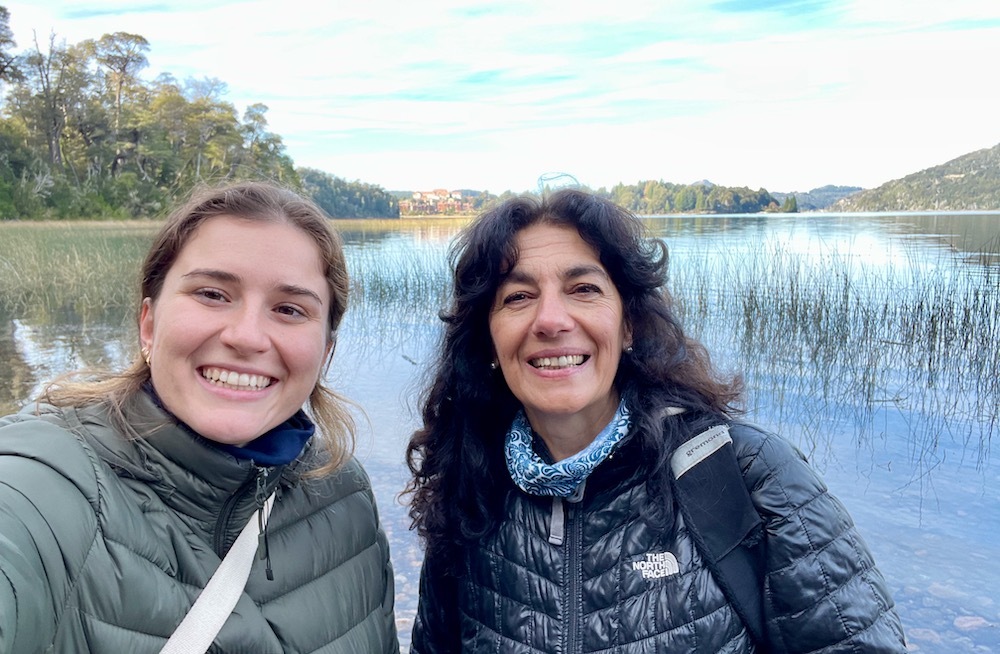
---
Al llegar a Bariloche, una ciudad de la provincia de Río Negro en la impresionante Patagonia Argentina, me recibió Mirta Elvira, fundadora de ACUFA (Asociación Civil de Usuarios, Familiares y Amigos de la Salud Mental). Después de meses trabajando juntas a través de Zoom, vernos en persona fue como el reencuentro con una vieja amiga. A lo largo de los días siguientes, tuve el privilegio de ser testigo del inestimable trabajo de la organización: una red de apoyo con la misión de garantizar que las personas con problemas de salud mental y sus familiares puedan acceder fácilmente a la atención y la información en la comunidad y puedan participar plenamente en oportunidades dignas de desarrollo personal a través del empleo y actividades creativas.
La provincia de Río Negro, en la que se encuentra ACUFA, fue pionera a nivel mundial en el establecimiento de una ley de salud mental que prioriza la desinstitucionalización en la atención de la salud mental. En otras palabras, esta ley - la ley 2440, más conocida como la “Ley de Desmanicomialización”- promovió la transición de un sistema de salud mental en el que las personas estaban confinadas al tratamiento dentro del hospital psiquiátrico a uno en el que son atendidas en un Hospital General y por una red de servicios con base comunitaria (dispositivos intermedios, casa de convivencias, centros culturales, empresas sociales). Desde esta atención integral, se brinda todo un sistema de apoyo para ayudar a las personas a hacer la transición de vuelta a la comunidad y participar plenamente en la sociedad. Sin embargo, desde que la ley entró en vigor en 1991, no han sido suficientes las políticas públicas para facilitar su implementación, debido a la falta de presupuesto acorde, entre otras cosas. Por ello, la labor de ACUFA destaca por ser uno de los únicos ejemplos exitosos y duraderos de atención y cuidados en salud mental desde una perspectiva comunitaria.
A la orilla del lago Nahuel Huapi, se encuentra Camino Abierto, el centro cultural al que está vinculado y en el que se aloja ACUFA. Acogido por sus coloridas paredes pintadas a mano y por sus integrantes tomando mate en la cocina, pude sentir inmediatamente la esencia de su nombre. Camino Abierto está abierto de lunes a viernes para cualquier persona de la comunidad que quiera pasar el día allí, participar en actividades culturales, deportivas y laborales -que van desde la danza hasta la cerámica, pasando por clases de cocina- o recibir apoyo terapéutico. El centro se gestiona en coordinación con el hospital local, por lo que hay diversos trabajadores de la salud mental disponibles para proporcionar apoyo psicológico y psiquiátrico cuando sea necesario. Rosa, por ejemplo, lee su poesía todos los miércoles en la radio de Camino Abierto, llamada “Radio la Mariposa”: "Me hace sentir que estoy viva, que alguien me escucha", comparte conmigo. La idea es que cualquier persona - con o sin diagnóstico de salud mental - es bienvenida en Camino Abierto, y puede aprender nuevas habilidades, pasar el rato con amigos o incluso dirigir un taller si hay un interés particular que quiera compartir con los demás. Camino Abierto ofrece a cualquier persona un espacio de pertenencia. Alfonso, que forma parte del equipo de ACUFA y dirige talleres de prevención de adicciones en Camino Abierto, me habló de la importancia de espacios como éste en la comunidad:
"Aprendí estando en Camino Abierto que de eso se trata la salud mental comunitaria, que la 'cura' está en la inclusión [y] en una mayor participación en el espacio social".
Durante uno de los talleres de cerámica, comencé a hablar con Feli, artista y madre de dos hijos, que se ha convertido en una habitual de Camino Abierto. Me cuenta que trabaja desde hace dos años en Maquinando, la empresa social textil que también forma parte de ACUFA. Poder tener un trabajo es fundamental para su bienestar: "Me reconforta mucho como mujer, como madre, y [me permite] recuperar un poco la integridad en torno a algo que no se tiene en cuenta, que es la dificultad de encontrar un trabajo cuando se está pasando por momentos muy duros. Y aquí tuve esa posibilidad".
Cuando tuve la oportunidad de ver al equipo de Maquinando en acción, estaban trabajando duro para terminar un pedido de la tienda local de bolsas para sus clientes. El equipo está actualmente al límite de su capacidad con el elevado número de pedidos que reciben de los comercios locales y del hospital (para el que hacen algunos de los uniformes), pero a medida que reciban más recursos, esperan crecer. Le pregunté a Feli dónde le gustaría ver a Maquinando en un futuro próximo: "De a poco ir creciendo como emprendedores que somos, me parece que eso está bueno. Que nuestra empresita de a poco vaya desarrollándose, a mí me reconforta mucho eso, [nos] incentiva."
Incluso fuera del espacio físico, el equipo principal de ACUFA trabaja sin descanso para concienciar y dar apoyo a la comunidad. Si no están asistiendo a un seminario en línea o reuniéndose con las instituciones locales, sus teléfonos están constantemente sonando con solicitudes de apoyo de familiares sobre experiencias difíciles de cuidado. Este es uno de los ámbitos de trabajo que el equipo espera formalizar en el futuro: establecer un centro de apoyo para los familiares, donde las personas puedan acceder a un lugar de apoyo, asistir a talleres de psicoeducación o recibir visitas a domicilio.
Sin embargo, a pesar de la demanda de la comunidad y la ambición de crecer, la falta de oportunidades de financiación, tanto a nivel local como internacional, hace que la ampliación de su trabajo sea muy difícil en este momento. El equipo de ACUFA trabaja de forma voluntaria, compaginando el funcionamiento de la organización con otros trabajos y responsabilidades. Actualmente, Ember está apoyando al equipo para desarrollar una estrategia de comunicación y consolidar un modelo operativo que apoye los esfuerzos de recaudación de fondos de la organización. Esperamos que la asociación Ember pueda apoyar a ACUFA en su crucial labor, dando ejemplo de un modelo de salud mental comunitaria.
Mate en mano, me dice Alfonso: "te demuestra que hay otra forma de entender la salud mental, que hay otra forma de entender a las personas"
¡Gracias al equipo por recibirme tan amablemente en Bariloche!